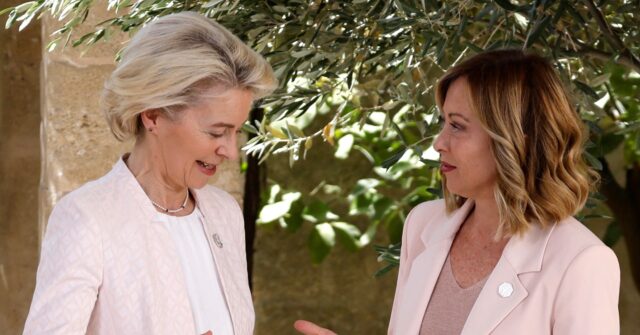In a significant political development, Italian Prime Minister Giorgia Meloni appears to be gaining traction in her stance on illegal immigration, as the European Union (EU) signals a potential alignment with Italy’s approach. The EU plans to establish offshore detention centers to hold illegal migrants, a move that would allow the bloc to process and remove those whose asylum applications have been denied without permitting them to remain within EU territory. European Commission President Ursula von der Leyen has indicated a willingness to break with her traditionally leftist support base in Brussels to pursue this strategy, particularly following the implementation of a deal crafted between Italy and Albania, leading to the transfer of illegal migrants to detention centers in Albania.
Von der Leyen’s acknowledgment of the Italy-Albania agreement highlights a shift in EU policy as member states increasingly impose stricter measures on migration and asylum seekers. In a letter to Euronews, she emphasized the importance of exploring the establishment of “return hubs” outside the EU in light of ongoing discussions about reforming return processes. This shift reflects the growing concerns among EU member states over the challenges of managing illegal migration, especially in light of increased pressures from national governments to secure borders and maintain public safety.
This political pivot towards a stricter immigration stance is gaining momentum, particularly as countries like Germany and Poland implement unilateral border controls and reconsider their migration policies in response to domestic pressures. Germany, facing backlash after recent violence linked to migrants, illustrates a broader swing in public sentiment against open borders. Poland’s decision to suspend its asylum program directly challenges EU immigration policy, further demonstrating the divisions within the bloc as some nations resist Brussels’ strategies in favor of nationalist approaches to immigration.
Moreover, the overall inefficacy of the EU in deporting illegal migrants—coupled with calls from 17 member states demanding greater autonomy in handling deportations—suggests a collective desire for a paradigm shift in immigration management. These countries argue for a new legal framework that enforces accountability for individuals without the right to stay in the EU and emphasizes consequences for non-cooperation, which would grant national governments enhanced control over the deportation process.
For Meloni, this shift in EU policy represents a political victory following criticisms from populists across Europe regarding her initial overtures to von der Leyen and the EU establishment. Her acknowledgment of the potential for an “Albania model” to inform broader European immigration policies indicates a growing acceptance of her approach to illegal immigration, particularly as Italy witnesses a marked decline of over 60% in illegal migration compared to the previous year. Additionally, Denmark’s interest in establishing similar arrangements further supports Meloni’s vision of a coalition of EU member states focused on stricter migration controls.
However, opposition persists, particularly from the socialist Spanish government, which argues that offshore detention centers would violate human rights of migrants. As Spain grapples with a 155% increase in illegal immigration this year, it advocates for a more comprehensive plan through the Brussels migration pact that seeks to redistribute illegal migrants across EU member states. This tension between advocates of stricter controls and defenders of migrant rights illustrates the complexity of EU immigration policy and the challenges in reaching a consensus amidst rising nationalist sentiments and differing national interests.

